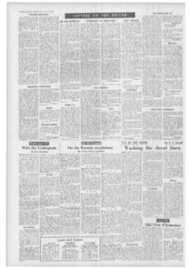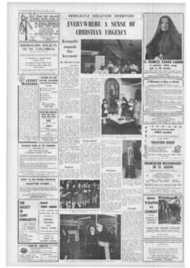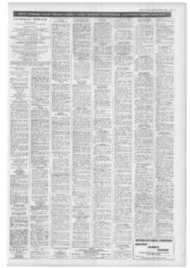Page 7, 17th May 1963
Page 7

Report an error
Noticed an error on this page?If you've noticed an error in this article please click here to report it.
Tags
Share
Related articles
By Alan Mcelwain
Outstanding 'source' At Vatican Council
Thanks To My English Friends
Rome Says: 'we
Censors In The Black Books
LETTER FROM ROME
by Alan McElwain
ONCE again, with several of my long-suffering fellow foreign correspondents, 11 have been performing, entirely without benefit of the Sacred Congregation of Rites, my, by now, routine miracle of reporting at the Vatican things that Vatican functionaries have made certain I could not see.
This time. it was the presentation to Pope John in St. Peter's of the Balzan Federation Peace Prize. The occasion, 1 read, was "glittering", "colourful", "moving", "solemn" and "inspiring". I say read because, although I was there, I might just as well have been seized at the entrance, blindfolded and tossed into whatever dark dungeon the Swiss Guard, Papal Gendarmerie, Gentlemen of the Cloak and Sword, or other
assorted ushers found conven ient. •
The "press gallery" into which I was unceremoniously dumped was high up overlooking a portion of the Ecumenical Council chamber in the basilica nave, but it overlooked precisely nothing else so far as I was concerned. The front part of the gallery, from which the only long view of St. Peter's was obtainable, was hogged entirely by shoulder-to-shoulder photographers and their paraphernalia and, even by standing on a chair, I could only just see the top of the Pope's head as he was carried in and out, and absolutely nothing of the section in front of the Papal Altar, where surrounded by his cardinals and other prelates (again I quote from my reading), the Holy Father received the homage of the Balzan officials and, from his throne, made his reply in French.
This I was able to hear over loudspeakers because, presumably by some strange oversight. the officials responsible for relegating me and my colleagues to our useless position had forgotten to ensure that we were deprived not only of sight but of sound.
The last act
EsOR many years now, the
treatment of the world's press on these Vatican occasions, and especially in St. Peters, has been a scandal. The "best seats in the house" are filled with nuns, students, priests, diplomats. and so on down the scale to mere hangerson, but the last people to be considered are those who are there to work.
For the funeral service of the late Pope Pius XII we were placed where we could see only the very last act of the long ceremony — the disappearance of the coffin into the crypt. We saw absolutely nothing of the traditional solemn ceremonies that preceded it and about which our countless millions
of combined readets expected us to write.
For the Coronation of Pope John, we were jam-packed into the back two rows of a tribune that set out to be exclusively for the press and, as ever, finished up by being used as an overflow section for anyone who happened to be about — the only qualification for privileged treatment being that they must not be journalists.
At the canonisation of Blessed Martin de Porres, I was covering for newsapapers and magazines in four different countries and with a combined colossal circulation, much of it Catholic. I went through all the irksome prelimininaries of obtaining the necessary "special" tickets of admission, arrived in the early morning and then, when I had been passed from hand to hand by various functionaries who seemed doubtful whether my tickets were genuine at all, was finally told that all they entitled me to do was "giro" — keep walking about. As the only place one could possibly walk was behind the tribunes already packed with other people, the provision of tickets for the privilege seemed a gross waste of time and paper.
Finally, as I was approaching a reserved section dominated by a letter which was identical with that on one of my tickets, an Italian gentleman in doublet and hose approached, gesticulating warningly and announced in what I took to be English, ''If you were to get in here, you would be keeked out". "That", I assured him. looking him straight in the eye, "would indeed be zee day", and at least I had the satisfaction of noting as I left that his medieval manners, like the medieval ruff at his throat, seemed slightly less akimbo.
Special audiences
T DO not like washing journalistic 1 linen in public. hut I think it important, especially in these vital Ecumenical Council days, that people everywhere who are constantly being told that the press prints irresponsible things about the Vatican, should appreciate the difficulties that correspondents come up against when trying to get at facts.
The Holy Father himself, from the very beginning of his pontificate, has shown the greatest possible solicitude for the press. He had made a point of giving special audiences to correspondents. At the same time. he has admonished them. over and over again, to report honestly and accurately and do their full share in getting across the Church's message. In particular he has urged them to help these days, as only they can, in the Ecumenical drive for unity. 1 and many others strive to do the amiable and cooperative Pope's bidding—but if only he knew flow his wishes—and our efforts—are deliberately frustrated by unimaginative and, at times, downright antagonistic employees below stairs!
blog comments powered by Disqus











